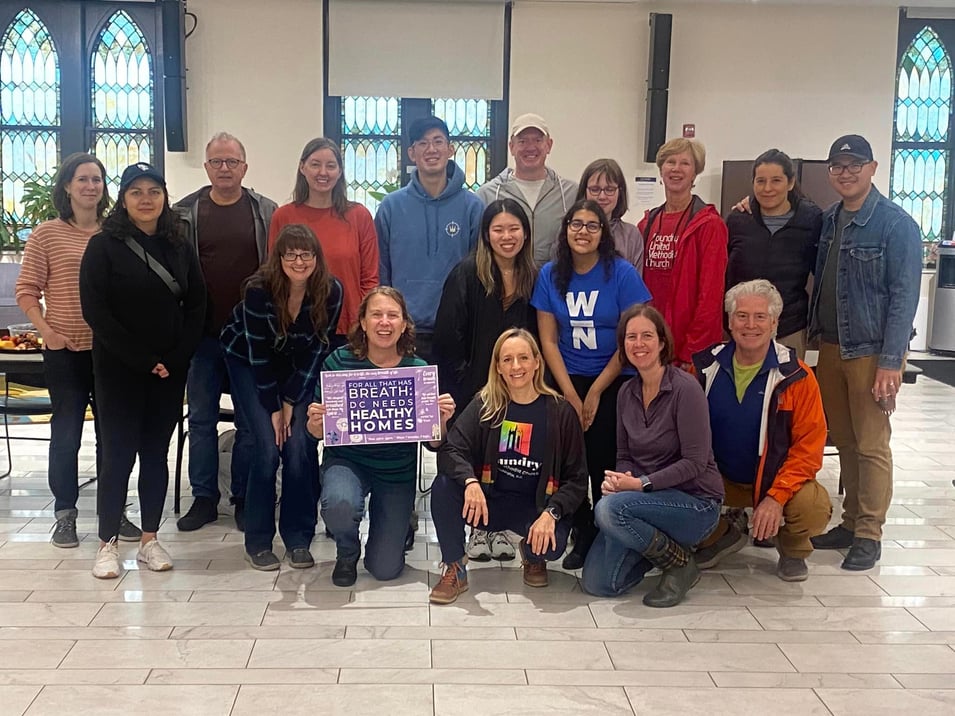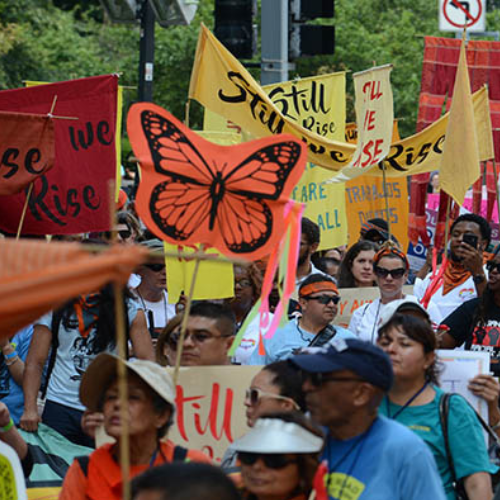The US Climate Action Network (USCAN) is the largest network of organizations focused on climate...
Washington Interfaith Network: Creating a Team Dedicated to Donor Engagement
Washington Interfaith Network (WIN), founded in 1996, is a District-wide citizens’ power organization rooted in local congregations and associations. WIN is committed to training and developing neighborhood leaders, addressing community issues, and holding elected and corporate officials accountable in Washington, DC. With a grant from Progressive Multiplier, WIN is building a volunteer-based Organized Money Power Team to conduct donor engagement and solicitation in support of their climate justice and housing programs.
Overview
In a pilot campaign, WIN trained and coached 22 members of their Money Power Team to identify potential donors among their contacts, determine the appropriate ask amounts, and solicit and steward these individuals. They are investing funds from the grant in recruiting additional members for their Team to grow to 100-150 members. They are also improving their database so they can more effectively track and manage donor interactions. Once a new donor is acquired, they will enter a welcome stream to further their involvement with the cause.
With support from Progressive Multiplier, WIN launched their Organized Money Power Team initiative to expand their individual donor base and create sustainable revenue streams. Prior to this initiative, individual donations represented only 9% of their income, with approximately $55,000 coming from 125 donors annually. By training volunteer leaders to engage in peer-to-peer fundraising and improving their donor communication systems, WIN aimed to build financial independence while strengthening their community organizing capacity.
Key Strategies & Tactics
- Money Power Team Formation: Recruiting and training 22 volunteer leaders to analyze donors, make one-on-one asks, and organize small group fundraising events
- Training and Support: Providing concrete tips and coaching on how to identify potential donors, determine appropriate ask amounts, and conduct effective solicitations
- Materials Development: Creating professional fundraising materials, including impact reports, to aid the Money Power Team in their asks
- Infrastructure Improvement: Upgrading donor tracking systems to allow for more thoughtful, personalized, and regular donor interactions
- Donor Engagement: Welcoming and engaging donors throughout the year to build relationships and encourage continued support
Lessons Learned
- Consistency Drives Results: In months when WIN actively asked for donations, they raised more money; when they didn't ask, donations decreased
- Visual Narrative Builds Trust: Developing impact reports and consistent communications about giving increased donor trust and comfort over time
- "Old School" Approach Works: Their growth team model proved effective, particularly when focused on board members who became askers themselves
- Professional Support Matters: Coaching from Progressive Multiplier and being part of a cohort provided valuable advice and support
- Investment Yields Returns: WIN observed that "The more you put into fundraising, the more you get out of it"
The Multiplier Effect
Impact
Through this initiative, WIN demonstrated how community organizing principles can be applied to fundraising with remarkable results. Their peer-to-peer approach not only increased financial resources but strengthened relationships within their network. Despite challenges including an executive transition, WIN maintained momentum and adapted their strategy effectively.
An unexpected benefit emerged when one potential donor offered to host an event instead of making a direct contribution, leading to a Jazz fundraiser. Additionally, when faced with challenges related to the October 7th attacks, WIN organized their first interfaith meeting, which grew into an ongoing interfaith panel that continues to support their work.
The success of WIN's Organized Money Power Team offers a blueprint for other community organizations seeking financial independence. By investing in volunteer leadership, providing adequate training and support, and developing compelling materials, organizations can build sustainable revenue streams while deepening community engagement.

Washington Interfaith Network (WIN), founded in 1996, is a broad-based, multi-racial, multi-faith, strictly non-partisan, District-wide citizens’ power organization rooted in local congregations and associations. WIN is committed to training and developing neighborhood leaders, addressing community issues, and holding elected and corporate officials accountable in Washington, D.C.

.png?width=1920&height=600&name=ROI%20(15).png)



.jpeg)
